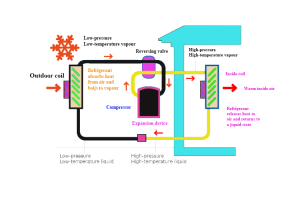Can Heat Pumps Work With Radiators? The Surprising Answer
Do heat pumps work with radiators If you have an older home with radiator heating and are considering an energy-efficient air source heat pump, you may wonder – will it actually work with the radiators already in place? The short answer is yes, heat pumps can utilize existing radiator systems very effectively with a few tweaks.
Radiators are a beloved retro feature nestled under windows, but transitioning to air source heat doesn’t require a full system redo. In fact, keeping radiators involved represents a sensible, budget-friendly way to reduce energy costs and carbon footprint without major renovations. Let’s break down how the pairing can work seamlessly for comfortable, eco-friendly heating.
How Do Heat Pumps And Radiators Interact?
Standard air source heat pumps extract warmth from outdoor air in all but the coldest months to supply buildings through ductwork like forced air furnaces. Do heat pumps work with radiators For radiator-equipped homes, heat pumps run in a similar fashion with one small change – they circulate heated water through radiators rather than air through vents.
A water-to-air or geothermal heat pump installed alongside a boiler extracts heat from outdoor air or ground and uses it to warm domestic hot water as usual. Do heat pumps work with radiators However, it also heats an integrated water storage tank which then distributes heated water to each radiator loop via the pre-existing boiler system piping.
Radiators dispense heat into rooms through convection currents just like always – the only difference is now a heat pump supplies the warm water rather than a boiler burning fossil fuels. This means no need for costly radiator replacements unless truly outdated – simply adjust the controls.
How Efficient Are Heat Pumps With Radiators?
Heat pumps work synergistically with radiators to provide very effective, low-cost heating. Do heat pumps work with radiators Since radiators remain the primary heat emitters indoors, homeowners gain major benefits:
Zone Control: Individual radiator thermostats customize heat levels room to room for maximum comfort and efficient usage.
No Ductwork: Radiator systems avoid expensive new ducting required by some heat pump installations, slashing renovation budgets.
Proven Reliability: Radiators have lasted 60+ years without issue, reassuring homeowners of the retrofitted system’s longevity.
Quiet Operation: Unlike noisy baseboard units, radiators circulate heat silently and discreetly.
Easy Install: Heat pumps integrate seamlessly into most existing radiator arrangements with minimal modifications required.
Importantly, heat pumps energized by radiators enjoy higher efficiency than standard electric resistance systems. They extract 3-5 times more heat per kWh by concentrating warmth already present outdoors rather than generating it entirely from scratch. Do heat pumps work with radiators For retrofit projects, this delivers substantial energy bill savings versus boiler replacements alone.
Comparing Efficiency Of Heat Pump Radiator Systems Do heat pumps work with radiators
To understand true operating costs when pairing heat pumps with radiators, Do heat pumps work with radiators let’s compare efficiency ratings:
Standard Boilers: Around 80-85% efficient when new, declining over time as components age.
Air Source Heat Pumps: 150-300% efficient (more heat generated than electricity used) thanks to supplemental captured outdoor heat.
Ductless Mini-Splits: 250-300% efficient but lack flexible zone controls.
Geothermal Heat Pumps: 300-600% efficient utilizing ground’s stable temperatures.
In short, even regular air source units coupled with radiators far surpass fossil fuel boilers in energy efficiency. Geothermal options paired with radiator systems deliver nearly free heating, paying themselves off within 5-10 years in most markets.
More Advantages Of Heat Pumps With Radiators
Aside from financial savings, Do heat pumps work with radiators radiator-adapted heat pumps provide several “green” and comfort bonuses as well:
- Carbon Savings: Drastically cut heating-related emissions versus gas/oil systems, helping combat climate heat pumps work change.
- Dual Use: Leverage heat pumps in shoulder seasons and radiators in extreme cold for dependable warmth.
- Modern Controls: Upgrade old thermostats/timers for individual room regulation and schedules via WiFi/app.
- Cooling Option: Some heat pumps also reverse cycle to deliver AC during hottest months with a simple switch.
- Zoned Comfort: Forget blowing heat where not wanted – heat pumps work radiators heat rooms consistently, fully.
So whether replacing an aging boiler or electrifying from fossil fuels entirely, heat pumps work do phenomenally complement existing radiator setups. Sustainable, efficient heat and domestic hot water are within reach without a full overhaul.
What radiators work best with a heat pump
When it comes to pairing radiators with a heat pump system, Do heat pumps work with radiators there are a few key factors to consider to ensure optimal performance:
Size – Larger, multi-panel radiators have more surface area to efficiently distribute heat throughout a room. Oversized ones may not heat up fully.
Material – Standard cast iron radiators conduct heat very well and tend to work best. Steel models work too but may feel slightly less warm to the touch. Avoid aluminum which conducts poorly.
Waterways – Radiators with multiport tube or pipe styles allow water to flow smoothly inside for even temperature control. Simpler one-pipe varieties can develop cold spots.
Vents – Top-mounted manual vents are important to periodically “bleed” trapped air out of radiator circuits for uninterrupted circulation. Look for this feature.
valves – Radiators equipped with thermostatic radiator valves (TRVs) offer zoned heating control matched to a room’s needs. This maximizes the heat pump’s efficiency.
In general, robust cast iron or steel radiators with multichannel waterways, vents and individual TRVs are ideal partners for heat pump systems. Do heat pumps work with radiators They ensure balanced, draft-free warmth and customizable comfort. Proper sizing too lets radiators absorb heat efficiently without over-taxing the pump. Stick to proven brands like Stelrad for reliability matched to modern heat source needs. With the right radiator picks, any heat pump will feel at home!
What size radiators do I need for a heat pump
Heat Loss Calculation: Getting a Manual J heat loss calculation done will tell you exactly how many BTU/hour of heat each room needs. Do heat pumps work with radiators This factors in size, layout, insulation, climate etc. to determine ideal radiator sizes.
Heat Pump Output: Make sure your radiators can be sufficiently heated by the heat pump’s maximum BTU output. Oversizing radiators strains the unit.
Room Dimensions: Bigger spaces may need larger radiators than small rooms to absorb and circulate adequate heat. Consider ceiling heights too.
Window Placement: Rooms with lots of glass need extra radiator surface area near windows to offset heat loss.
Existing Pipes: Use radiators that fit your existing pipe spacing for easy installation over tearing out walls.
Aesthetics: Proper proportions prevent single short/skinny radiators from looking odd in big rooms.
Most HVAC contractors can calculate sizes or you can use radiator sizing charts online based on all these factors for each space. Do heat pumps work with radiators Don’t go too small and don’t oversize either – getting it just right maximizes the comfort and efficiency of your new heat pump! Feel free to contact me if any other questions come up during your planning process.
How much electricity do heat pumps use
- Air-source heat pumps are typically the most energy efficient when outdoor temperatures are around 45°F. As it gets colder outside, they use slightly more power. On a very cold day (0°F), their efficiency is usually around 150-200% of a regular electric heating system. Do heat pumps work with radiators
- Larger homes will need bigger heat pumps. Expect to use 800-1200 kWh per month during winter for a 1,500-2,500 sq ft home, depending on insulation level. Smaller homes use less.
- Geothermal heat pumps are the most efficient option and tend to use 25-50% less electricity than air-source pumps. Monthly bills may be 500-800 kWh in winter.
- Mini-split heat pump systems often use the least power, around 500-800 kWh/month even for fairly large houses. Their efficiency remains high at all outdoor temps.
- Thermostat programming, adequate insulation, air sealing, and maintaining your heat pump can lower usage by 10-20% from these estimates as well.
So in summary, a properly sized and installed heat pump for the average home should increase winter electricity bills by 30-80% compared to non-electric heating. But the savings on gas/oil far outweigh the extra marginal cost on your power bill annually.
Readmore>>>>>>>>> Working Principle of Heat Pumps for Dummies
In Summary
Now you know heat pumps can be a sensible long-term solution even for homes graced with vintage radiators. Their behind-the-scenes synergy spares homeowners from radical system reworks by integrating seamlessly. Combined with smart controls and zoning abilities, heat pumps transform radiators into eco-friendly workhorses again for another 60+ years of use. If you love the elegant aesthetics radiators lend, this could be your most cost-effective pathway to lowering carbon footprint AND annual utility bills too.
FAQ Frequently Asked Question
Q: Can all heat pumps work with radiators or only certain types?
A: Most air source and geothermal heat pumps can connect to existing radiator systems with slight modifications. Do heat pumps work with radiators Look for units labeled as “compatible with radiators/hydronic heating” for proper installation and components. Mini-splits may not work as well without ducting.
Q: Will I need to replace old radiators themselves?
A: Likely not unless they’re truly ancient/ decrepit. Radiators are very durable and typically outlast boiler/furnace lifetimes. A cleaning may revive older ones. Only replace if leaking badly after pressure testing pipes.
Q: Can I still use radiator thermostats for zoning?
A: Absolutely! Individual thermostats are what make zoning with radiators so effective versus whole-home heating. A heat pump lets you keep this easy control over each room’s temperature.
Q: How do I size a heat pump properly for my radiator setup?
A: Have an HVAC pro perform a Manual J load calculation based on your home/climate specifics. They’ll advise the right sized unit to balance costs, comfort and efficiency. Don’t underestimate to ensure adequate heating capacity for worst days.
Q: Will radiators still get very hot to the touch?
A: Not as piping-burning hot as with older boilers pushing 200°F water. Do heat pumps work with radiators Most heat pumps provide comfortable 105-130°F water which warms rooms well without scalding dangers near radiators like before.
Q: What maintenance is required now versus a boiler?
A: Much less than boilers needing annual cleanings, tuneups, etc. But do still flush radiator circuits occasionally, check pumps/valves annually, and bleed radiators if air gets trapped inside. Proper care helps ensure long system life. Do heat pumps work with radiators
Hope this gives you more clarity on pairing heat pumps with radiators!





